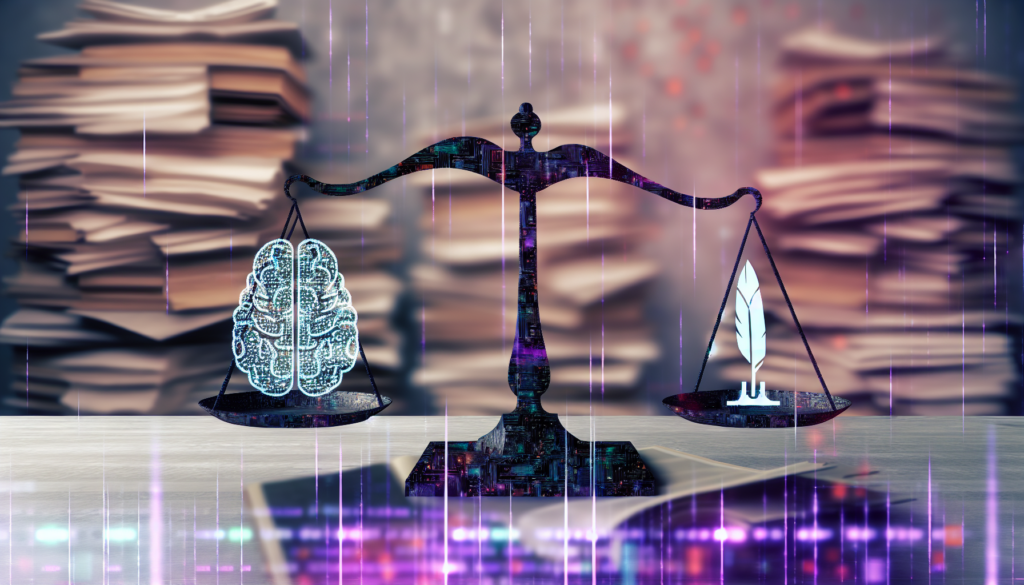Exploring the OpenAI New York Times Case 2024: A Legal and Ethical Odyssey
The Background of the OpenAI New York Times Case 2024
The legal battle between OpenAI and The New York Times has become a landmark case in the evolving narrative of copyright law and artificial intelligence. In 2024, the clash of titans ensued when The New York Times initiated legal proceedings against OpenAI, alleging that the company’s generative AI, notably ChatGPT, was trained on millions of articles without proper authorization.
According to an article by The New York Times, the lawsuit argues that the AI’s capabilities directly compete with the news outlet, potentially diluting the value of their copyrighted work. The Times sought not only legal remedies but also proposed the idea of a commercial agreement with “technological guardrails” to protect intellectual property.
This case sets a significant precedent as it questions the legality of using copyrighted material to train AI systems that can generate similar content. The outcome of this case could reshape the future of AI development and its intersection with copyright law.
The Debate on AI Copyright Law Precedents
The OpenAI New York Times case has ignited a debate on the application of existing copyright law to AI. One of the central questions is whether the use of copyrighted documents to train AI models constitutes fair use or infringement.
An Ars Technica analysis suggests that OpenAI may rely on precedents set by earlier cases, like the Google Books ruling, to defend its actions. However, the unpredictability of legal outcomes, as highlighted by the article, means that OpenAI’s defense could either succeed or fail, with wide-ranging implications for AI development.
The legal discourse is complex, with arguments weaving through the nuances of copyright law, the transformative nature of AI-generated content, and the potential for AI to benefit society.
Generative AI Fair Use and the Transformation Argument
The concept of fair use is pivotal in the OpenAI New York Times case. Generative AI’s ability to produce original content after being trained on copyrighted material has led to the “transformation” argument, which is often used to defend fair use claims.
This argument posits that if the AI-generated content is sufficiently transformative, it may not infringe on the original copyright. However, the Associated Press reports that professional writers and media outlets, including The New York Times, are prepared to challenge this notion in court, indicating a contentious battle ahead.
The outcome of this argument will have far-reaching consequences for how AI companies can use copyrighted content and could potentially set new legal standards for fair use in the digital age.
AI in Journalism Ethics and the Impact on News Media
Beyond the legalities, the OpenAI New York Times case raises profound ethical questions about the role of AI in journalism. The integration of AI in newsrooms can lead to concerns about authenticity, accountability, and the displacement of human journalists.
The ethical debate is not just about whether AI should be used in journalism but how it should be used. The New York Times emphasizes that generative AI cannot replace a subscription to a reputable news source, as it cannot serve up articles at will. This distinction between AI as a tool and AI as a replacement is central to the ethical discussion.
The journalism industry must navigate these ethical waters carefully, balancing innovation with the preservation of journalistic integrity and the public’s trust.
AI Freedom of Expression Los Angeles and the Future of AI in Creative Industries
Los Angeles, a hub for creative industries, is also becoming a focal point for discussions on AI and freedom of expression. The OpenAI New York Times case touches on this topic by questioning the extent to which AI can be used to create content that may be subject to copyright.
The issue of AI freedom of expression in Los Angeles extends beyond journalism to encompass entertainment, literature, and other creative sectors. The city’s stance on this matter will influence how AI is adopted and regulated in creative fields, potentially leading to a new era of AI-enabled creativity.
As AI continues to evolve, the creative industries in Los Angeles and beyond must adapt to the changing landscape, ensuring that innovation does not come at the expense of creators’ rights.
For a deeper dive into the implications of AI on copyright law and journalism, or to discuss how Bee Techy can assist your organization in navigating the complexities of AI integration, please contact us for a quote.
